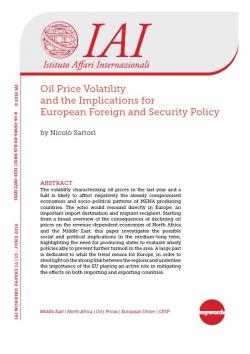Oil Price Volatility and the Implications for European Foreign and Security Policy
The volatility characterising oil prices in the last year and a half is likely to affect negatively the already compromised economies and socio-political patterns of MENA producing countries. The echo would resound directly in Europe, an important import destination and migrant recipient. Starting from a broad overview of the consequences of declining oil prices on the revenue-dependent economies of North Africa and the Middle East, this paper investigates the possible social and political implications in the medium-long term, highlighting the need for producing states to evaluate wisely policies able to prevent further turmoil in the area. A large part is dedicated to what the trend means for Europe, in order to shed light on the strong link between the regions and underline the importance of the EU playing an active role in mitigating the effects on both importing and exporting countries.
This paper was realised by the Istituto Affari Internazionali (IAI) with the support of Eni. It is the result of an Eni initiative aimed at fostering the debate in view of the elaboration of the European Union’s Global Strategy.
-
Details
Roma, IAI, June 2016, 26 p. -
Issue
16|15 -
ISBN/ISSN/DOI:
978-88-98650-95-8
Introduction
1. The economic impact of falling oil prices in producing countries
1.1 Financial and economic effects
1.2 Socio-economic policies
1.3 Energy sector policies
2. The effects of low oil price in a destabilised region
2.1 Internal political effects
2.2 Regional political effects
3. The MENA region in trouble: Implications for the EU
3.1 Foreign policy and security implications
3.2 Energy security implications
4. Falling oil price: An opportunity to re-engage the MENA region?
4.1 An EU concept for support to Energy and Climate Sector Reform?
References



